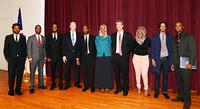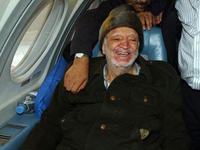-
Death of Muslims used by extremists for recruitment, propaganda
In the last thirty years, conflicts in Afghanistan, Iraq, Bosnia, Chechnya, Somalia, and other countries have caused the death of four million Muslims. The theme of innocent Muslims dying as result of conflicts initiated by Western powers and their allies is a central motif used by Islamic militants to recruit new members. It is a theme which fuels anti-American sentiments in the Middle East and North Africa. Historians and Islamic scholars note that the notion that the West is orchestrating a “genocide” of Muslim is patently false, and that beginning with the Iran-Iraq War (1980-88) and continuing to the present day, more and more casualties are inflicted by Muslims against Muslims. Still, the myth of a non-Muslim genocidal “crusade” against Muslims is powerful, and is one which is effectively used by al Qaeda and other Islamic terrorist groups.
-
-
Acoustic detection identifies IEDs – and their explosive yield
A number of different tools are currently used for explosives detection. These range from dogs and honeybees to mass spectrometry, gas chromatography, and specially designed X-ray machines.A new acoustic detection system, consisting of a phased acoustic array that focuses an intense sonic beam at a suspected improvised explosive device, can determine the difference between those that contain low-yield and high-yield explosives.
-
-
Terrorism insurance should cover cyberterrorism: industry

The Terrorism Risk Insurance Act(TRIA) is a federal backstop designed to protect insurers in the event an act of terrorism results in losses above $100 million. Industry officials question whether cyber terrorism is covered by the program, which is administered by the Treasury Department. Industry insiders note that terrorism risks have evolved since TRIA was enacted and cyberterrorism is now a real threat. TRIA should thus not simply be reauthorized with a blanket stamp of approval; instead there should be a discussion about whether acts of cyberterrorism should be explicitly included in TRIA.
-
-
Israel destroys another missile shipment from Syria to Hezbollah
Israeli warplanes on Friday destroyed a Syrian military convoy carrying advanced missiles to Hezbollah. The air strike was approved in a secret meeting of Prime Minister Benjamin Netanyahu’s security cabinet on Thursday night. The target of Israel’s Friday attack were remotely operated missiles, with a range of about 950 miles, which were manufactured in China and upgraded in Iran. This is the fifth Israeli attack in which shipments of advanced weapons from Assad to Hezbollah were destroyed. The earlier four attacks took place on 30 January, 3 May, 5 May, and 5 July.
-
-
Psychologists: psychology research should promote peace and nonviolence
Political psychologists argue that psychology’s contributions can extend beyond understanding the origins and nature of violence to promoting nonviolence and peace. In a paper, they say they oppose the view that war is inevitable and argue that understanding the psychological roots of conflict can increase the likelihood of avoiding violence as a way to resolve conflicts with others.
-
-
U.S. worries about proliferation of drone technology
A new Amnesty International report about U.S. drone use in the war on terror says that the drone campaign is killing so many civilians, that it does not only violate international law, but may be a war crime. The report also says that the growing use of drones by the United States in Pakistan, Yemen, and Somalia encourages their use by other states and groups. The United States rejects the figures of civilian casualties cited in the Amnesty report as unreliable, and says that the research methodology the report’s authors used is deeply flawed. The United States does agree, however, that there is a reason to worry about the proliferation of drone technology. “Going forward this is a technology that we know more people will probably get access to,” a State Department spokeswoman said.
-
-
Al Qaeda-linked groups among world's most active terrorist groups
Only one of the 5,000 terrorist attacks in 2011 is attributed to al Qaeda Central, but more than half of the top 20 most active perpetrator groups in 2011 are linked to al Qaeda, according to new data released laste week in the Global Terrorism Database (GTD), compiled by the National Consortium for the Study of Terrorism and Responses to Terrorism (START) based at the University of Maryland. The GDT, a comprehensive, unclassified database of terrorist incidents, now contains information on more than 104,000 domestic and international terrorist attacks between 1970 and 2011. These attacks resulted in more than 225,000 deaths and more than 299,000 injuries.
-
-
2008 drone killing of al Shabab leader used phone info collected by NSA
Court documents filed in the case of Basaaly Moalin, a San Diego cab driver of Somali origin accused of aiding al Shabab, reveal that the 2008 killing by a CIA drone strike of al Shabab leader Aden Hashen Ayrow was aided by information collected by the NSA metadata collection program. The NSA was able to pinpoint Ayrow’s real-time location by tracking calls between him and Moalin. Lawyers for Moalin are appealing the conviction on grounds that he was unconstitutionally targeted by the NSA’s surveillance program.
-
-
MI6 asks for more spies in Afghanistan to fight terrorism after NATO withdrawal
MI6, the U.K. Secret Intelligence Service, is calling for reinforcements from other agencies in order to strengthen the U.K. intelligence presence in Afghanistan after NATO forces withdraw from the country in 2014. Intelligence analysts warn that Afghanistan will become an “intelligence vacuum” which will allow terrorists to pose an increased threat to Britain. Intelligence sources said that Britain’s intelligence agencies were already “very stretched” and focused on potential threats from Yemen and Somalia, a fact which might persuade al Qaeda to seek to exploit the lack of attention to Afghanistan.
-
-
Physicians feared terrorists might hack Dick Cheney’s cardiac defibrillator

In a 60 Minutes segment aired yesterday (Sunday), former vice-president Dick Cheney told the interviewer that his doctors turned off the wireless function of his implanted cardiac defibrillator (ICD) “in case a terrorist tried to send his heart a fatal shock.” Asked about the concern of Cheney’s physicians, electrophysiologists — these are the cardiologists who implant ICDs – say that as far as they know, this has never happened in the real world but that it is impossible to rule out the possibility.
-
-
Fighting al-Shabab’s recruitment efforts in U.S. Somali community

Somali community organizations in the Minneapolis-St. Paul area are taking a proactive approach to the war against terrorist recruitment in America’s Somali community. “Given our support for the African peacekeeping mission, and the fact that the U.S. remains a top al Qaeda target, we need to get ahead of al-Shabab’s efforts to radicalize vulnerable youth,” House Foreign Affairs Committee chairman Representative Ed Royce (R-California) said in his opening remarks at the hearing on the subject earlier this month.
-
-
Iraqi war- and occupation-related death toll estimated at half a million
A scientific study calculating Iraqi deaths for almost the complete period of the U.S.-led war and subsequent occupation estimates, with 95 percent of statistical certainty, that the total excess Iraqi deaths attributable to the war through mid-2011 to be about 405,000 (“excess” death means death not related to natural causes or causes other than the war and occupation). The researchers also estimated that an additional 56,000 deaths were not counted due to migration. Including this number, their final estimate is that close to half a million people died in Iraq as a result of the war and subsequent occupation from March 2003 to June 2011.
-
-
Man arrested in connection with LAX dry ice bombs
Four dry ice bombs were planted in restricted area of LAX Sunday and Monday. Two bombs exploded, causing no injury or damage, and two were found before they exploded. The LAPD announced it had arrested 28-year-old Dicarlo Bennett, an LAX employee of one of the airport’s ground crew contractors, Servisair. The LAPD chief says the police and FBI believe there was “no nexus” between the bombs and terrorism, but that the incident is related to a labor dispute.
-
-
No proof Yasser Arafat was killed by radioactive poisoning: scientists

Yasser Arafat died in November 2004 in a French hospital after rapid deterioration in his condition. He was 75 years old, but in good condition, and Palestinian and French doctors could not identify the reason for his decline. Even before he died, Palestinian leaders spread the rumor that he was poisoned on the orders of then-Prime Minister Arik Sharon of Israel. Last year, the Palestinian Authority agreed to a request by Arafat’s widow, Suha, and French judicial investigators to exhume his body for further tests. Tissues were harvested and were examined, along with some of Arafat’s personal effects, by Swiss, French, and Russian scientific teams. The Swiss team published its report this weekend in the leading medical journal The Lancet, saying that traces of the radioactive polonium-210 were found on some of Arafat’s personal effects, but not in his body tissues. The Swiss team uses suggestive language – the evidence they found “support the possibility of Arafat’s poisoning with polonium-210” and that his symptoms in the weeks before he died “might suggest radioactive poisoning” – but admit that the absence of evidence of polonium-210 in body tissues makes it impossible to say with certainty that Arafat was poisoned. The Russian scientists are more definitive. “He could not have died of polonium poisoning — the Russian experts found no traces of this substance,” Vladimir Uiba, the head of Russia’s Federal Medical-Biological Agency, said earlier today (Tuesday).
-
-
Halt of CFATS work disrupts debate over program’s merit
The budget impasse-related halting of monitoring and enforcing compliance with the 2007 Chemical Facility Anti-Terrorism Standards (CFATS) comes at a time of growing criticism of the measure by GOP – but not only GOP – lawmakers, who complain that there are too many problems with CFATS and the way it has so far been implemented.
-
More headlines
The long view
What Does Netflix’s Drama “Adolescence” Tell Us About Incels and the Manosphere?
While Netflix’s psychological crime drama ‘Adolescence’ is a work of fiction, its themes offer insight into the very real and troubling rise of the incel and manosphere culture online.
